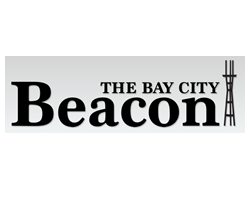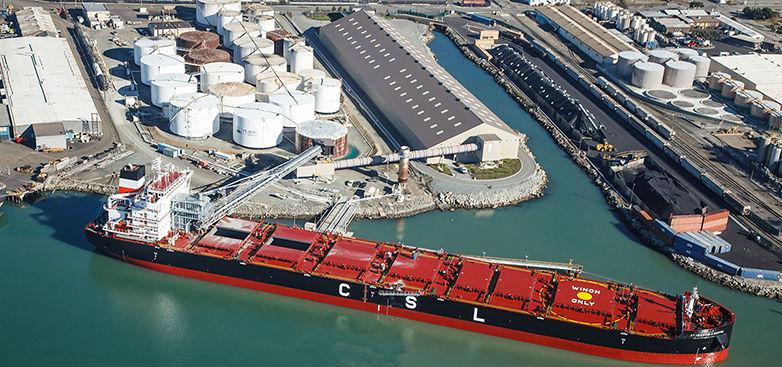Richmond Planning Commission Says Yes to Coal

By Tom Molanphy
September 17, 2019 - After a contentious summer rally between environmentalists and union workers, the Richmond Planning Commission voted unanimously to keep coal in Richmond.
On a warm evening in late July, the “No Coal in Richmond” organizers gathered on the steps of Richmond’s City Hall to urge the city’s Planning Commission to phase out the storage and handling of coal and “petcoke,” a petroleum byproduct, in Richmond. They came prepared with two large banners (“Protect Our Health” and “Coal Outta Richmond!”), red-rally t-shirts, and a mic stand to whip up supporters.

Photo by Ralph Cooksey-Talbott
They did not come prepared for the large contingent of coal workers, many in their blue work suits and orange hardhats, who met their anti-coal speeches with bull-horn amplified chants of “Local 3!” and “Our Richmond Too!” while holding signs asking “Are Our Jobs Too Dirty For You?”
The sad binary of recent environmental debates - a choice between a healthy economy or a healthy environment - played itself out yet again. And not in the oil fields of North Dakota or in the rainforests of Brazil, but right in the heart of the San Francisco Bay Area.
The legislation in question, the Coal and Petroleum Coke Ordinance, would impact the Levin-Richmond Port most severely. A 37-year old privately owned business with over 50 union worker jobs, Levin-Richmond has increased coal exports from Utah and Wyoming on their way to Asia since 2013, particularly loads headed to Japan, which has been shoring up its energy options after the Fukushima Daiichi nuclear disaster of 2011.
The Sierra Club reported that the annual export of coal and petcoke out of the Port of Richmond more than doubled in four years, from nearly a half-million metric tons in 2013 to 1.2 million tons in 2017. The environmental concern is that the coal being brought by train and dumped in piles at Levin-Richmond Port are uncovered, which may allow coal dust to spread throughout neighborhoods.
Residents have reported black dust on their cars and in their yards for several years to BAAQD (Bay Area Air Quality Management District), spurring the creation of AB 617, which would measure the safety of emissions in and around the terminals to develop a safe emissions plan.
For many of the “No Coal In Richmond” speakers, waiting for the results of AB 617, which could take years, to confirm that the black dust is unhealthy is unacceptable. They believe the ordinance allows ample time for Levin-Richmond Terminal to transition to healthier exports, which would also address the global problem of climate change that burning coal exacerbates.
“African Americans, Hispanic North Americans, Asian North Americans and Native Americans are usually the least able politically and economically to oppose these facilities,” Reverend Dr. Dale Weatherspoon of Easter Hill United Methodist Church said. “As a result, our communities have become dumping grounds with devastating economic and health consequences.”
“I want everyone to remember when you were a child and did not have fresh air, what did it mean to get sick and not go to school?” WCCUSD Trustee Val Cuevas asked. “I want you to know that your kids and my kids cannot afford to be out of the classroom because they are sick.”
“When coal goes through our cities, it’s a hazard for all of us,” activist filmmaker Brenda “BK” Williams said.
“I really dislike it when slogans are misappropriated,” City Council member Eduardo Martinez said. “They are trying to make it sound like we are against union jobs, but we’re not.”
“My concern is how coal will affect my family. I have a daughter who is asthmatic,” Indigenous Leader Courtney Cummings said. “Working in the medical field, I see firsthand how this (coal) affects people who have respiratory problems.”
The war of escalating chants continued until the group representing workers moved to an adjacent building where the actual vote would take place. PR reps from this group made printed letters available to media from the Council of Industries in Richmond and The Industrial Association of Coal of Contra Costa County. Both letters were against the ordinance and stressed the need for BAAQMD to complete the air monitoring required by AB 617.
“We want the data to come in before they make a decision,” Mike Carroll, District Representative and Trustee of Operating Engineers Local No. 3, said.
If the ordinance passed, warned The Council of Industries, “what will prevent future ordinances from targeting other businesses and industries in Richmond, and unilaterally deciding, based on political ideology or “issue of the day” that they cannot handle and store various products?”
Timothy Walker, a lifelong Richmond resident, had been moving between the two groups to gather as much information as possible.
“I came out here because I was concerned about the environment and my community,” Walker said. “I came here to talk about health, but I didn’t realize what kind of impact it would have on the union jobs.”
Walker expressed hope that some kind of compromise could be met, that the choice between health and jobs wasn’t the only choice available.
Five hours later, the Richmond Planning Commission made an unanimous choice between possible health impacts and jobs: jobs.
“No Coal In Richmond” promises the fight is not over. The City Council will consider the ordinance, as well as the Planning Commission’s unanimous recommendation against the ordinance, later this year.
And the fight in Richmond is only part of a larger struggle against fossil fuels throughout the country and the Bay Area.
Twenty-one states sued the federal government in August over the decision to allow states to upgrade old coal-fired power plants. “No Coal In Oakland” is also fighting against a coal terminal in Oakland, and many Bay Area cities have made pledges towards becoming carbon neutral. California passed a law in 2018 requiring the state to derive 100% of its energy from zero-carbon sources by 2045.

